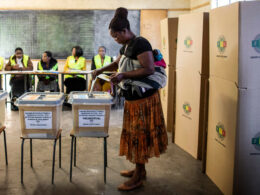The Zimbabwe Electoral Commission (ZEC) recently called for those who qualify for postal voting in the 2023 election, to apply to the electoral management body. This factsheet explains who is eligible for postal voting and how to go about the process.
What is postal voting?
Postal voting can be simply defined as voting in an election where ballot papers are distributed to electors and typically sent back by post, in contrast to electors voting in person at a polling station.
The postal voting system entails the following steps:
Certain voters who will not be able to get to their polling stations on polling day can apply to ZEC for a postal vote.
ZEC sends each applicant a ballot paper for each election – Presidential, Constituency and Local Authorities, plus an envelope marked with details of their polling station.
The voter puts an X on each ballot paper opposite the candidate of his or her choice, seals each ballot paper into its envelope and sends the envelopes back to ZEC. ZEC then distributes the envelopes, in tamper-proof packets, to the voters’ polling stations where they are counted along with the ordinary votes.
Who can vote using postal voting?
According to the Electoral Act, section 72, the only people who can vote by post are registered voters who on polling day, will be unable to vote as he or she will be:
(a) on duty as a member of a disciplined force or as an electoral officer; or
(b) on duty in the service of the Government outside Zimbabwe; or
(c) outside Zimbabwe as the spouse of a person referred to in paragraph (b); and so unable to vote at a polling station in the constituency.
How do people apply for postal voting?
Section 73 (1) of the Electoral Act states that a person who wishes to vote by post may apply to the Chief Elections Officer for a postal ballot paper.
“Provided that applications for postal ballot papers by members of a disciplined force may be made to the Chief Elections Officer only through their commanding officers. (2) An application for a postal ballot paper shall be :(a) in the prescribed form; and (b) signed by the applicant and accompanied by—(i) a certified copy of the voter’s national registration certificate; and (ii) except in the case where the application is submitted (individually or as part of a batch of such applications) by a commanding officer on behalf of a member of a disciplined force, a letter from the applicant’s head of Ministry, head of department or head of station; or the head of Zimbabwe’s Embassy or diplomatic or consular mission in the foreign State where the applicant is employed stating the capacity in which the applicant is employed by the Government and where the applicant will be employed on the polling day or polling days, as the case may be, in the election,.” reads the Electoral Act.
Application for postal voting must be sent to ZEC not later than two weeks after nomination day as stated by the Electoral Act of section 73 (2) (c).
“(3) Where more than one election is to be held concurrently in any constituency, a single application form may be used by applicants who apply for postal ballot papers in all those elections. (4) The Commission shall ensure that application forms for postal ballot papers are available at all Embassies and diplomatic or consular missions of Zimbabwe located in foreign countries. (5) The Chief Elections Officer shall number in consecutive order of their receipt all applications for postal ballot papers received by him or her, and shall permit them to be inspected by members of the public, free of charge, until the declaration of the result of the poll, when they shall be dealt with in terms of section 70(3).”
Offences linked to postal votes
Section 80 of the Electoral Act states that a person who attempts to induce any other person to obtain a postal ballot paper with the intention of influencing him or her by bribery or intimidation to record his or her vote in favour of a particular candidate shall be guilty of an offence and liable to a fine not exceeding level six or to imprisonment for a period not exceeding one year or to both such fine and such imprisonment and, in addition to any such punishment, may if he or she is convicted of that offence by the High Court, be declared by the High Court to be disqualified from voting at any election for a period not exceeding five years.
“(2) Any person who (a) makes or induces any other person to make a false statement in an application for a postal ballot paper; or (b) fails to deliver or post forthwith an envelope containing or purporting to contain a postal ballot paper entrusted to him or her by a voter for the purpose of delivering or posting it to the Chief Elections Officer; shall be guilty of an offence and liable to a fine not exceeding level six or to imprisonment for a period not exceeding one year or to both such fine and such imprisonment,” states the Electoral Act.








